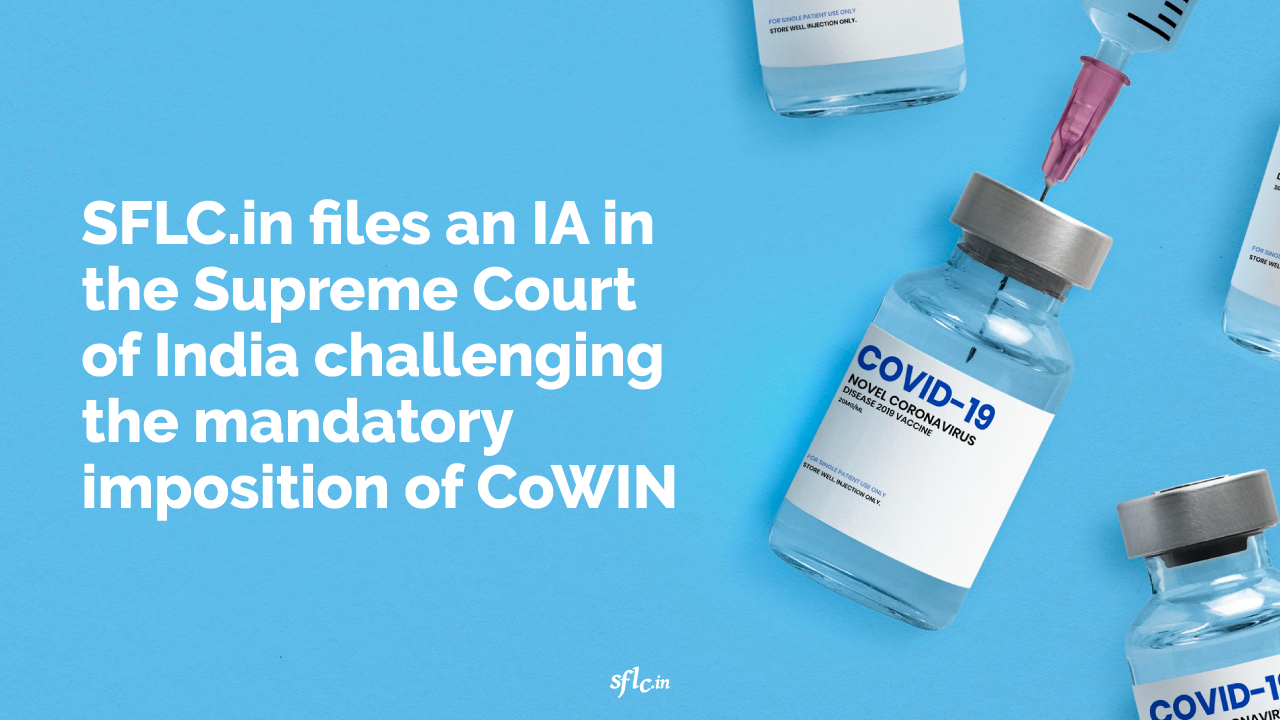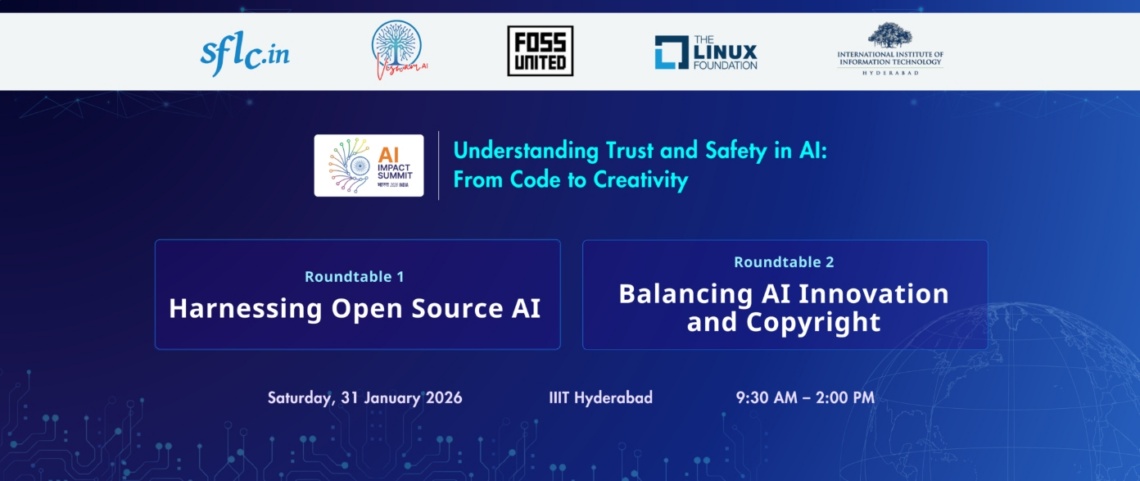SFLC.in files an intervention application in the Supreme Court of India in Re Distribution of essential supplies and services during pandemic challenging the mandatory imposition of CoWIN
SFLC.in has filed an intervention application (hereinafter “the Application”) in the Supreme Court of India in suo motu case Re Distribution of essential supplies and services during pandemic (Suo Motu WP No. 3 of 2021). The Application draws the Court’s attention towards the mandatory imposition of CoWIN for 18-44 age group, its de-facto imposition for 45+ age group, the technical glitches, and the privacy concerns arising from CoWIN. SFLC.in is represented by AOR Prasanna N, and lawyers from SFLC.in.
The Application has been filed on the basis of following concerns related to CoWIN
1. Mandatory imposition of CoWIN for 18-44 age group
The Application highlights the digital divide in the country in terms of smartphone penetration, access to internet and digital literacy vis-a-vis the tussles which have emerged in rural areas. The digital divide is underscored by the several reports about the tussle between locals from rural areas and people from urban centres wherein youth from urban areas have been booking vaccines in rural primary health care centres relying on their superior digital access and skills. This has led to the overcrowding of rural vaccination centers, an uneven distribution of the vaccination process which has consequently deprived the already digitally disadvantaged group of individuals who are 44 and above.
According to Telecom Regulatory Authority of India’s performance indicators, India has approximately 58 internet subscribers out of 100 people. While CoWIN allows 4 registrations per number, that does not necessarily mean that this deficit would be bridged, and the registration process for those without smartphones or internet connections would be seamless. The Application cites the IAMAI’s 2019 report on internet penetration. It states that India has approximately 40% internet penetration.
2. Press Release allowing on-site registrations
The Government of India has released a PIB Press Release dated 24.05.2021 titled “On-Site registration/facilitated cohort registration in addition to Online Appointment for 18-44 year age group now Enabled on CoWIN”. According to the Press Release, walk-in / on-site registration for the 18-44 age group has been allowed. However, it is a mere eyewash as it leaves it on the State Governments/ UTs to implement this decision.
3. De-facto imposition of CoWIN for 45 + age group
The use of CoWIN has also been made de-facto mandatory for those above the age group of 45 years. While the Respondent 1 and 2 have allowed walk-ins and desk registration for this age group, the available slots at vaccination centres are reflected online. This leads to the section of tech-savvy literate class from urban centres booking slots online. This deprives vaccine access to citizens who cannot pre-book their slots online from vaccination.
4. Misuse of open APIs
The Open API of CoWIN is in consonance with the Government of India’s policy on Open APIs, certain technological savvy people have been able to create prompts which immediately notify them about vaccine availability via e-mails or Telegram notifications. This is because the Government has designed the website in such a way that the frontend of the website makes the API calls leading to this.
This can lead to a situation similar to “Tatkal Train Ticket Booking” business. People will start paid services claiming to book vaccine slots as soon as they open up. This will particularly push those without adequate digital literacy and access to margins.
5. Lack of a specific privacy policy
The Application highlights the lack of a specific privacy policy in the CoWIN portal, and that it is not in compliance with the principles of data protection laid down in Justice K.S. Puttaswamy vs. Union of India ((2017) 10 SCC 1). The privacy policy linked to the Portal leads to the Health Data Management Policy which was released by the MoHFW in December, 2020. The Health Data Management Policy is a generic policy governing health data and in itself raises several privacy concerns. Neither does the Health Data Management Policy specify data sharing and collection under CoWIN nor does it justify the data minimisation, retention, and proportionality aspects of CoWIN.
6. Technical glitches
SFLC.in has also highlighted the technical glitches faced by people including the issues related to the OTPs and incorrect registrations. The CoWIN portal has failed to address the basic task of processing registrations correctly. There have been innumerable reports of citizens facing hardship because of incorrect registration or a false allocation or mismatch of phone numbers.
7. Central Government’s affidavit in Re distribution of essential supplies and services during pandemic
The Government of India, in its affidavit in the Supreme Court, has submitted that reliance can be placed on Common Service Centres (hereinafter “the CSCs”). According to the Annual Report on CSCs 2019-20, there are 2,53,134 Gram Panchayats as of March, 2020. Each Gram Panchayat covers a few villages. Of these 2.53 lakh Gram Panchayats, 2,40,792 are registered with CSCs. This means that approximately 13,000 Gram Panchayats are not covered by the CSC scheme.
According to Census 2011, India had 6,45,856 (six lakh forty five thousand eight hundred and fifty six) villages across the country. This means that not every village has a CSC in it. There is a significant likelihood that this would lead to overcrowding at limited CSCs leading to catastrophic results which the Government of India intends to curtail by the mandatory imposition of CoWIN.
SFLC.in had written to the NHA, PMO, and MoHFW twice highlighting the challenges related to CoWIN. You can read them here and here.




